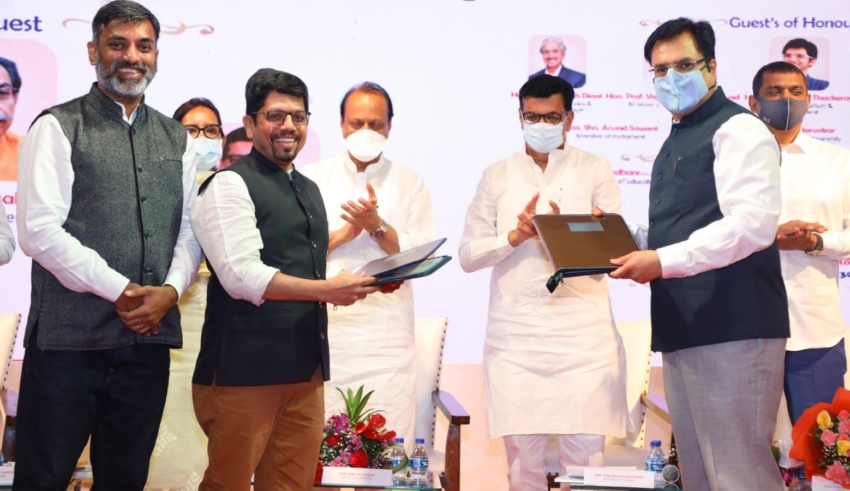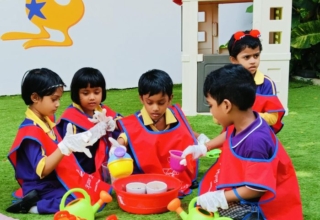
Swajivi Maharashtra is designed for students from grades 6 – 9 and in the initial phase an estimated 50,500 students will benefit
Maharashtra Young Leaders Aspiration Development program (MYLAP) waslaunched on June 6 as an entrepreneurial nurturing mindset among school children in Maharashtra and will go by the name of ‘Swajivi Maharashtra.’ The program is to be implemented in 488 schools in 35 districts for the students of grades 6th to 9th and is being developed by the SCERT in collaboration with ENpower, an entrepreneurship learning ecosystem for schools that runs India’s Future Tycoons or popularly known as IFT fir school students.
Sushil Mungekar, CEO & Co-founder, ENpower talks on “How ENpower will spearhead Swajivi Maharastra and mentor school students in Entrepreneurial skills.”

What is the Swajivi Maharashtra program?
Maharashtra Young Leadership Aspiration Program (MYLAP) is the Maharashtra government’s ambitious scheme initiative for state’s young adults. Under this broad scheme, the Ministry of School Education Maharashtra and SCERT, in association with ENpower (Enlearning Skill Development private Limited) are launching Swajivi Maharashtra to build a holistic ‘entrepreneurship learning ecosystem’ for school children by bringing all stakeholders on a common platform. The idea is to build experiential, engaging, and effective interventions.
Swajivi focuses on preparing students for an uncertain future by building an entrepreneurship mindset. This will empower them with the ability to steer their career as their own enterprise. The word Swajivi itself means self-reliant. It is also an acronym: Swa stands for Swapna (dream), Ji stands for Jidd (drive) and Vi stands for Vishwas (Confidence). Swajivi will empower children with the potential to ‘dream’ of a better future, fuel their ‘drive’ to fulfill these dreams and build the ‘confidence’ to achieve them.
Students undergoing the program will build the ability to discover opportunities arising in their surrounding ecosystem. They will build an ability to create innovative ideas to solve real-world problems. Students will be empowered to take initiative in creating means for their livelihood by utilizing their skills and passions. They will not just create value for themselves but also for society.
What are the components of the Swajivi Maharastra program and approach to its implementation?
Students between grades 6 to 7 will be introduced to entrepreneurial life skills such as critical thinking, creativity, communication, collaboration, decision making, managing failures, taking initiative, decision making, resource management and problem-solving. Students of Grade 8 to 9 will undergo advanced learning like innovative problem solving, product designing, creating value propositions, building business and revenue models, managing money & finances, as well as driving change in society. The age-appropriate learning program allows children to learn at their pace.
The program aims at fostering curiosity, creativity and imagination in students. They will develop empathy towards their surroundings and people; use it to identify problems and build tangible solutions. Swajivi will help students think independently and build their confidence. With Swajivi, students discover their passions, dreams, and goals and effectively put action plans to achieve them. It will also build their skill to communicate, collaborate, and manage resources (including financial resources). Students build the ability to learn from their mistakes and manage failures.
Implementation
We have built a structured program that will be deployed through a team of expert trainers, using a unique pedagogy that creates a fun, experiential and engaging learning environment. The program comprises gamified workshops and simulations, hybrid learning deployment using video-based content, in-class activities and facilitator-led sessions, hands-on learning interventions where students build projects solving local problems, etc.
We have also created a mentor network involving 350-400 entrepreneurs, start-up founders, incubators, industry professionals, Maharashtra Chamber of Commerce, etc. to prepare students for real-world challenges and opportunities.
At a district level, we have created a mentorship framework for ideas that have the potential to launch. At the state level, we showcase the talent of TOP 100 groundbreaking ideas. Here students will present their ideas to industry veterans and get support in form of seed funding, mentorship, and incubation.
Will this program entail exams and a systematic curriculum?
Swajivi Maharashtra follows a structured curriculum that is age-appropriate and is designed to give students a hands-on experience that builds an entrepreneurship mindset, design thinking abilities and relevant technological skills through engaging interventions. Our students get to apply the skills as they learn them. The periodic assessments are focused on the student’s ability to apply skills rather than their memorization ability. The design of the program itself allows a learning-while-you-build approach. Besides the assessment reports, the ideas innovated by students are also a key metric to measure the skills they have acquired.
What is ENpower’s plan of action for the selected schools?
A breathtaking experience awaits the students of semi-urban and rural Maharashtra. 50,500 students of grades 6 – 9 from 488 model schools will witness this program that gives them the exposure to a first-world learning experience. ENpower’s pilot project, Swajivi Maharashtra starts soon with 488 model schools, impacting 50,500 students from grades 6 – 9.
What is the benefit of such a program in the immediate future?
Over the last three decades, we have seen a great transformation in the ‘jobs of future’ as well as the ‘future of jobs’. Children undergoing school education today will have to face these uncertainties while starting their careers or professions by 2030. The current school education system is based on creating a knowledge base, preparing students for examinations, promoting rote learning, and developing marks/grade orientation. This is not adequate to prepare children for an uncertain future.
As present day students start their careers in their 20s, they need to be better prepared to identify problems, convert them into opportunities, build tangible solutions and create value for themselves and society.
Entrepreneurship learning shifts focus from a ‘job-seeker mentality ’ to a ‘job creator’ one. Maharashtrian children should no longer be viewed as a job-centric population. They should be the cornerstone in making India a nation of job-creators.
Entrepreneurship learning encompasses more than just business studies, it helps children to nurture a mindset of an entrepreneur, equipping them with 21st-century life skills. Most life skills published by the Organization of Economic co-operation & Development (OECD) as ‘Skills of 2030’, resonate with an entrepreneurial mindset such as problem-solving, decision making, critical thinking, dealing with ambiguity, managing failures, resource management, creative thinking, collaborative skills, leadership, risk-taking, and opportunity evaluation.










